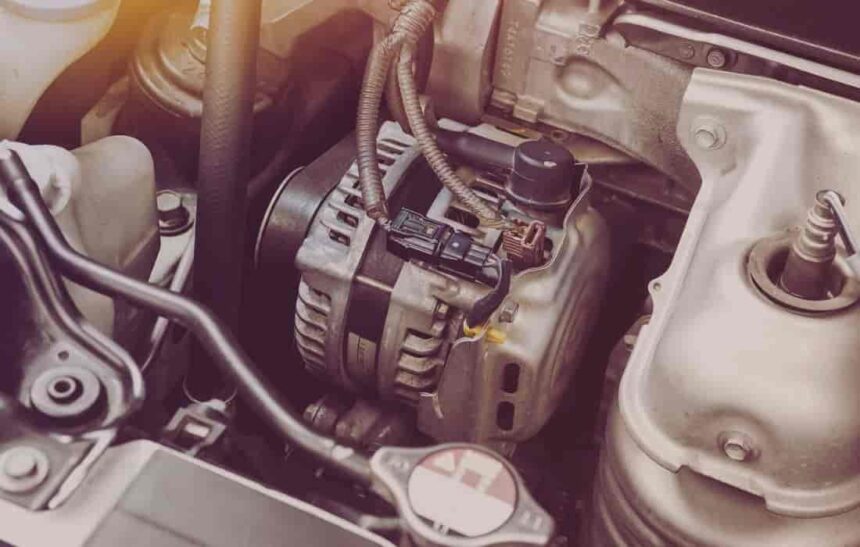As car owners, we rely on various components to ensure the smooth operation of our vehicles. One crucial component that often goes unnoticed until problems arise is the alternator. Responsible for generating power and charging the battery while the engine is running, the alternator plays a vital role in keeping our cars functioning properly. In this article on IchieTech, we will explore seven regular signs that may indicate a bad alternator, helping you identify potential issues before they escalate into major problems.
List of Signs of a Bad Alternator
- Dimming or Flickering Lights
- Strange Noises
- Battery Issues
- Warning Lights
- Electrical Failures
- Difficulty Starting the Engine
- The Smell of Burning Wires or Burnt Rubbers
1. Dimming or Flickering Lights
One of the most common signs of a faulty alternator is dimming or flickering lights. The alternator powers the vehicle’s electrical system, including the lights. If you notice your headlights or interior lights becoming dim or flickering while driving, it could be an indication of an alternator problem. This issue is particularly noticeable at night or when using multiple electrical components simultaneously. Possible causes for dimming or flickering lights include a worn-out alternator belt, a faulty voltage regulator, or damaged internal components. To resolve the issue, it is essential to have a professional mechanic inspect and diagnose the problem accurately.
2. Strange Noises
Another telltale sign of a faulty alternator is the presence of strange noises. Faulty alternators often produce abnormal sounds that can range from a grinding or whining noise to a squealing or growling sound. These noises typically arise from damaged bearings, a failing pulley, or loose internal components. Pay attention to any unusual sounds coming from the engine compartment, especially when the car is idling or when you accelerate. If you notice any strange noises, it is advisable to consult a qualified mechanic promptly to prevent further damage.
3. Battery Issues
The alternator and the battery work hand in hand to provide electrical power to the vehicle. Consequently, a faulty alternator can lead to various battery-related problems. If you frequently find yourself dealing with a dead or weak battery, even after it has been recently replaced, it could be a sign of a failing alternateur. Other symptoms include slow cranking of the engine, difficulty starting the car, or the battery warning light illuminating on the dashboard. To determine if the alternator is the culprit, a mechanic can perform a charging system test to assess its functionality accurately.
Also read:
4. Warning Lights
Modern vehicles are equipped with dashboard warning lights that illuminate when a problem arises. Some warning lights are specifically designed to alert you about issues related to the alternator. The most common warning light associated with alternator problems is the battery warning light, which typically resembles a battery-shaped symbol. If this light appears on your dashboard while driving, it is essential to take it seriously and address the issue promptly. Ignoring the warning light may result in further damage to the electrical system or a complete breakdown of the vehicle.
5. Electrical Failures
A failing alternator can cause a range of electrical failures within the vehicle. Electrical components such as power windows, air conditioning, and the radio rely on the alternator’s power supply. Therefore, if you experience malfunctions or complete failures of these components, it could indicate a problem with the alternator. For instance, if your power windows become slow or unresponsive or if the air conditioning starts blowing warm air, a faulty alternator may be the root cause. Seeking professional assistance is crucial to diagnose and rectify these electrical issues effectively.
6. Difficulty Starting the Engine
A healthy alternator ensures that the battery has sufficient charge to start the engine. If you encounter difficulties starting your vehicle, it might be a sign of a faulty alternateur. A faulty alternator fails to provide the necessary electrical power, resulting in slow or unsuccessful engine cranking. You may notice the engine struggling to start, requiring multiple attempts before it finally runs. In such cases, it is advisable to have the alternator inspected by a skilled technician to prevent potential breakdowns and further damage.
7. The Smell of Burning Wires or Burnt Rubbers
If an unpleasant smell similar to burning rubber or wires saturates the air, it could signify that certain components of your alternator are gradually deteriorating. The perpetual tension and friction endured by the alternator’s drive belt, coupled with its proximity to the scorching engine, can cause it to deteriorate over time, thereby releasing an undesirable aroma akin to that of burning rubber.
Likewise, if your alternator is being excessively strained or if its wires have become frayed or damaged, you might detect a burning scent reminiscent of an electrical fire. An overburdened alternator attempts to force an excessive amount of electricity through its wires, leading to hazardous heat generation. Moreover, compromised wires hinder the smooth flow of electricity, resulting in their overheating and emission of an offensive odour.
Conclusion
Recognizing the signs of a bad alternator is essential for maintaining the overall health of your vehicle. By paying attention to dimming or flickering lights, strange noises, battery issues, warning lights, electrical failures, and difficulty starting the engine, you can identify potential problems early on. Promptly addressing alternator-related issues can prevent costly repairs and ensure the continued reliability of your car. Remember to consult a professional mechanic for accurate diagnosis and appropriate solutions, as they possess the expertise to handle alternateur problems effectively. Regular maintenance and vigilance will keep your alternator in good working order and help you enjoy a trouble-free driving experience.










